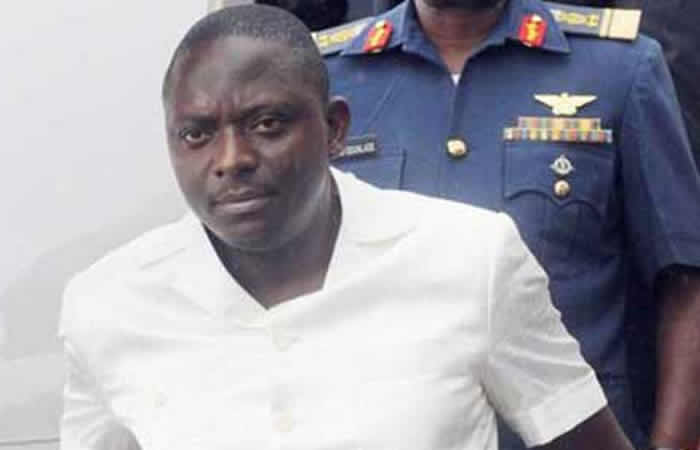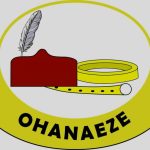By Onozure Dania
THE Federal High Court sitting in Lagos, on Monday, discharged and acquitted a former Director-General of the Nigerian Maritime Administration and Safety Agency, Patrick Akpobolokemi, of alleged N8,537,586,798.58 fraud preferred against him by the Economic and Financial Crimes Commission.
Akpobolokemi was appointed Director-General of NIMASA by former President, Dr Goodluck Jonathan on December 22, 2010 and was sacked on July 16, 2015, by the immediate-past President Muhammadu Buhari.
By July 30, 2015, Akpobolokemi, was arrested by the EFCC in Lagos and was detained at the Lagos office of the commission in the Ikoyi area of the city.
He has, since, been facing a series of trials in cases preferred against him by the EFCC.
Akpobolokemi was first arraigned on December 4, 2015, at the Federal High Court in Lagos, over the alleged diversion of N2.6bn from the coffers of the NIMASA between December 2013 and May 2015.
The prosecution claimed that the funds were approved by ex-President Jonathan for the implementation of a security project tagged, ‘International Ship and Ports Security Code in Nigerian Ports.’
Justice Ibrahim Buba of the Federal High Court in Lagos, on October 16, 2017, dismissed Akpobolokemi’s no-case submission to the case.
Not satisfied, the ex-NIMASA DG approached the appeal court for a retrial of the N2.6 billion fraud case.
The Court of Appeal, Lagos Division, on June 1, 2018, discharged and acquitted Akpobolokemi.
Others charged alongside Akpobolokemi were Ezekiel Agaba, Ekene Nwakuche, Governor Juan, Blockz and Stonz Ltd and Al-Kenzo Logistics Ltd.
In a lead judgment delivered by Justice Yargatta Nimpar, the court upheld the no-case submission filed by Akpolokemi in response to the criminal charges preferred against him by the EFCC and overruled the decision of the lower court.
Justice Nimpar discharged and acquitted Akpobolokemi of the entire 22 counts.
He, however, ordered that Agaba, Nwakuche, Juan, Blockz and Stonz Ltd and Al-Kenzo Logistics Ltd, had cases to answer and returned them to the lower court for trial to continue.
In the latest case, Akpobolokemi was arraigned alongside one Josphine Otuaga, a staffer of NIMASA, a former Commander of the Joint Task Force Operation Pulo Shield, Major-General Emmanuel Atewe (retd), and another staffer of NIMASA, Kime Engonzu on an amended 22 counts bordering on conspiracy, conversion, and stealing (by fraudulent conversion).
Justice Ayokunle Faji, in his judgment on Monday, discharged and acquitted Akpobolokemi while delivering a ruling on a no-case submission filed by him and the fourth defendant, Otuaga, in the 22 counts filed against them.
While discharging and acquitting Akpobolokemi and Otuaga, Justice Faji held that the EFCC failed to establish a prima facie case against them.
Justice Faji, however, ruled that Major-General Atewe (retd) and Engonzu had to open their defence because they had a case to answer in counts 12 to 22 of the charge.
Akpobolokemi had, in a no-case submission filed by his lawyers, Dr Joseph Nwobike (SAN), leading Collins Ogbonna, prayed the court for an acquittal without having him present a defence.
He stated that the prosecution, with all its witnesses and evidence tendered while making its case, failed to link him to the alleged crimes.
Akpobolokemi and others were said to have, sometime in 2014, in Lagos, with intent to defraud, conspired amongst themselves to commit an offence to wit: conversion of the sum of N8,537,586,798.58 property of NIMASA.
According to EFCC, the offence contravened Section 18(a) of the Money Laundering (Prohibition) Act 2012 and was punishable under Section 15(3) of the same Act.
They had pleaded ‘not guilty’ to the charges and, upon conclusion of the prosecution’s case, all the defendants opted for no-case-submission.
Justice Faji, while delivering his ruling, held that none of the witnesses called by the prosecution led any shred of evidence linking the first defendant, Akpobolokemi and the fourth defendant, Otuaga, to the offences they were charged with.
The court also held that having regard to the totality of the evidence, the prosecution failed to provide any credible evidence linking the first defendant with the commission of the crimes alleged against him in counts one to 11 of the first amended charge and/or established a prima facie case against him warranting him to enter his defence.
The court further noted that out of the 11 witnesses called by the complainant, only one witness, (PW 2), gave evidence where the name of the first defendant (Akpobolokemi) featured, while other witnesses made it clear that they did not know the first defendant and did not have any dealings with him.
“If there is no sufficient evidence linking the accused with the statutory elements and ingredients, a court of trial must, as a matter of law, discharge him. It has no business searching for evidence that is nowhere,” the judge ruled.
“The first and fourth defendants are hereby discharged and acquitted, while second and third defendants are to open their defence,” he further ruled.
Source: The Punch








